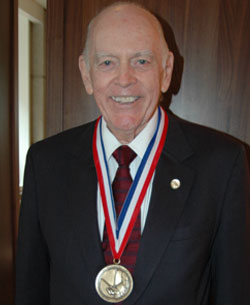About the WORLDSymposium™ Roscoe O. Brady Award

Each year, WORLDSymposium recognizes one individual for innovation and accomplishment in the field of lysosomal disease research and therapy. This award was renamed the Roscoe O. Brady Award to honor one of the early pioneers in lysosomal research, Roscoe O. Brady, MD, who was a beloved mentor to many currently working in the field. Dr. Brady passed away in 2016, and WORLDSymposium renamed the annual Innovation and Accomplishment Award to honor his achievements.
Award Nominations Deadline: September 3, 2024.
Click here to submit an Award Nomination.
The award is presented annually to recognize substantial contributions to lysosomal disease research and therapy. The recipient is presented with an engraved award and is recognized at the WORLDSymposium scientific meeting held annually in February. The award winner is also invited to present a 30-minute address as the opening speaker at WORLDSymposium, and an announcement of the award recipient is included in the February special lysosomes issue of Molecular Genetics and Metabolism. (This award is given on a yearly basis, but can be omitted in any given year at the discretion of the Planning Committee.) Nominations are solicited annually from members of the lysosomal disease community, planning committee members and attendees of WORLDSymposium.
Past Award Recipients:
2004 William Krivit, MD, PhD
2006 Henri A. Termeer
2008 Roscoe O. Brady, MD
2009 Elizabeth F. Neufeld, PhD
2010 William S. Sly, MD
2011 Steven U. Walkley, PhD
2012 John J. Hopwood, PhD
2013 Robert J. Desnick, PhD, MD
2014 Gregory A. Grabowski, MD
2015 Stephen C. Groft, PharmD
2016 Emil D. Kakkis, MD, PhD
2017 Konrad Sandhoff, PhD
2018 Mark E. Haskins, VMD, PhD
2019 Danilo A. Tagle, PhD, MS
2020 John F. Crowley
2021 Ellen Sidransky, MD
2022 Stuart A. Kornfeld, MD
2023 William A. Gahl, MD, PhD
2024 Elsa Shapiro, PhD